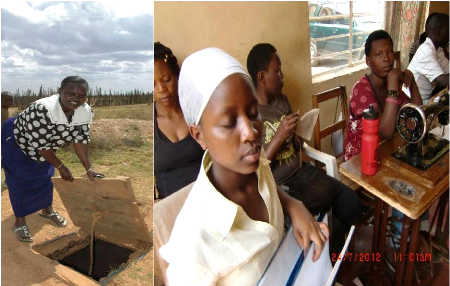5.1. INTRODUCTION
This chapter represents a brief summary of findings of the
study by expressing the general view of what the researcher discovered during
the research. It is also in this chapter that the researcher's recommendations,
suggestions and conclusion are mentioned.
5.2. CONCLUSION
The aim of this research is to explore the impact to
microfinance intervention on women economic empowerment and the circumstances
under which microfinance can help the poor women out of their poverty
situation. Microfinance provides employment to the poor women who have no other
means of income. Women are highly represented in self-employment and operating
small income generating activities. Therefore, microfinance has the potential
to have a powerful impact on women's economic empowerment.
Women need, want, and profit from credit and other financial
services. Strengthening women's financial base and economic contribution to
their families and communities plays a role in empowering them. To a large
extent, access to capital or credit may be the only input needed to start women
on the road to economic empowerment.
However, women have indicated that often they also value the
non economic benefits of microfinance services. Some of the most valued
benefits include expanded business and social networks, improved self esteem,
increased household decision making power, and increased respect and prestige
from both male and female relatives and community members.
Pro-Femmes/ Twese Hamwe through Duterimbere MFI has proved to
be a powerful instrument toward women empowerment, enabling them to build
assets, increase incomes, and reduce the vulnerability to economic stress. All
women who receive a loan, gain access to additional resources and have
succeeded in controlling their loans and using them to generate independent
incomes.
Targeting women continues to be important for Pro-Femmes/
Twese Hamwe through Duterimbere in design of its products and services, mainly
because women by default have less access to credit and because they face
constraints unique to their gender. Product design and program planning should
take women's needs and assets into account.
56
By building an awareness of the potential impacts of their
programs, PTH through Duterimbere can design product, services, and service
delivery mechanisms that can break women economic dependence and enhance their
economic empowerment.
Even when products and services target primarily women, some
women still face considerable challenges relative to men because of more
limited resources (land, houses) greater domestic burden, weaker self
confidence and less education.
Some do target the most vulnerable, while others target the
entrepreneurial poor and the not-so-poor. Furthermore, the clients interviewed
may have started off very poor and improved their livelihood through the
microfinance, made available by Profemmes Twese Hamwe partners. Obviously, even
if a client is not «ultra-poor», she may have a long way to go before
attaining a sustainable livelihood. Microfinance makes a valuable contribution
to reaching that goal.

In just a few years period Mukamisha Leoncie has gone from
dependence on food aid to producing and distributing food products and
employing members of the community thanks to loans of Duterimbere Microfinance
as well as the widow women association.
Awareness Based on the reasons given by PTH
offices and MFI partners for the cause of women not being able to enter into
certain businesses, there is ample scope for gender-related awareness rising.
Time required for caring tasks, lack of education and training, and inadequate
skills are
57
mentioned as reasons women cannot perform certain work. Land
ownership and sole capital ownership by men are apparently also still widely
available and acceptable reasons for withholding opportunities from women.
All in all, most interviewees seem satisfied with the
microfinance services as offered.
Most clients, in general, have a better life than before. By
implementing a limited number of changes to the microcredit programs of MFI
partner more direct involvement of PTH offices in gender related issues and
gender training at various levels optimal use can be made of knowledge already
available and enthusiasm at all levels. As Pro-Femmes/ Twese Hamwe is working
on a country wide scale, an extra increase in women's empowerment could benefit
women in many different countries.
In the Pro-Femmes/ Twese Hamwe offices that completed the
questionnaire, 54% of staff is female. The number of women staff is just one of
many criteria in a gender audit, but this is a positive result. There is a
relation between the number of women on staff and gender mainstreaming in
general. It is mainly through female staff that gender issues are really
mainstreamed, notwithstanding the fact that men have a positive view and input.
With regard to the expansion of gender and empowerment-related programming in
future, this is very promising.
Microfinance, one of Duterimbere in partnership with
Pro-Femmes/ Twese Hamwe main activities, can be a very useful instrument in
contributing to women's empowerment, and offers women a free choice with regard
to the way they want to use their talents. If some extra efforts are made, the
contribution could be even larger.
Microfinance has not been able to reach the poorest at the
bottom of the poverty line and therefore the claims that it will reduce poverty
for the majority poor remains a mere myth.
However, it's worth noting that, Pro-Femmes/ Twese Hamwe
through Duterimbere MFI has reached a number of poor people who previously had
been excluded from the formal banks. The program has been successful in
reaching the poor especially women who have not been served by the traditional
financial institutions and findings indicate that it has reduced poverty among
the borrowers.
The MFI also besides group-based lending program has recently
introduced individual lending for long term borrowers with excellent repayment
records. This will enable microfinance borrowers to easily graduate to formal
banking system in future. However, the study findings
58
indicate that microfinance was likely to have greater positive
impacts in urban than in the rural and this suggests differences in
opportunities, women poverty levels and microfinance products
appropriateness.
| 


